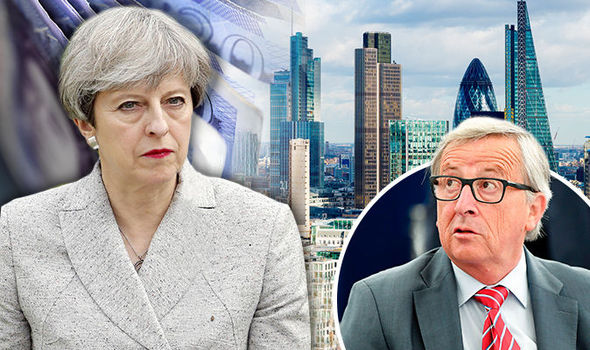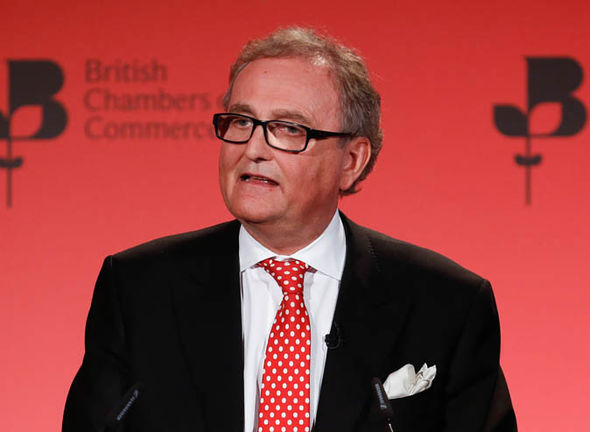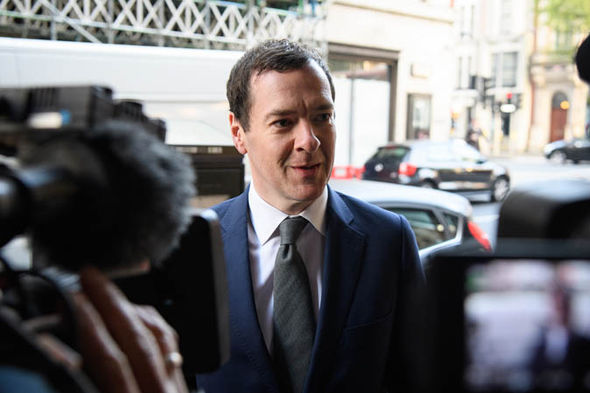Niinhän sitä olettaisia, mutta Express on näitä lehtiä jotka ovat osoittautuneet kirjoittavan ihan mitä tahansa roskaa Brexitistä. Lehtihän on hieman kotimaisten iltalehtien ja MV-roskan välissä.Niin, enpä tiedä, mutta olettaisin että ovat varmaan tuolla UKssa asiaa miettineet:
http://www.express.co.uk/news/polit...ain-better-off-without-no-deal-EU-Theresa-May
BREXIT BOOST: Britain would be '£156 billion a year better off WITHOUT a deal with EU'
NEW analysis has revealed that Britain would be better off by £156 billion a year by simply walking away from the EU without a deal.
By David Maddox, EXCLUSIVE
PUBLISHED: 22:00, Wed, Jun 14, 2017 | UPDATED: 22:01, Wed, Jun 14, 2017

John Longworth has issued 'a Brexit fight back'
Former British Chambers of Commerce director John Longworth has issued “a Brexit fight back” after Remainers have tried to capitalise on the hung parliament election result to claim that Theresa May’s vision of a clean Break with the EU is “dead”.
The annual boost - worth around a third in growth for the British economy - would continue for at least 12 years as Britain’s economy is transformed by throwing off the shackles imposed by Brussels.
It is the equivalent of adding the entire NHS and defence annual budgets back into the UK each year.
With France and Germany putting pressure on the UK to change its mind and Remainers attempting to force the UK to at least stay part of the Single Market under Brussels rule, Mr Longworth has released analysis on behalf of Leave Means Leave to show that Britain will be hugely better off even if talks break down.
He pointed out that just three measures; deregulation, the reinvesting the net UK contribution to the EU, and removing external tariffs to the rest of the world imposed by the EU, would amount to a 7.2 per cent boost to our economy, between £120 and £150 billion.
This is before extra boosts to the economy created by new free trade agreements being set up around the world.
Writing for the Daily Express online, he said: "This would be like increasing our economic growth rate by a third every year for twelve years! "

Mr Longworth pointed out that EU regulation has created a high cost to the UK
The intervention by the co chairman of Leave Means Leave comes as Remainers attempt to hijack the election result to undermine Brexit and keep Britain in the single market.”
The boost to the economy includes 4 per cent of GDP from removing EU tariffs to the rest of the world, 2.5 per cent from scrapping EU red tape and 0.7 per cent from Britain’s net contribution of more than £10 billion to Brussels.
Currently, the 7.2 per cent total is worth an extra £156 billion a year.
In his paper - Engaging Business on the Benefits of Brexit - Mr Longworth pointed out that EU regulation has created a high cost to the UK.

Mr Tice accused Mr Osborne of spinning the election result as 'a rejection of a clean Brexit'
He noted that the Open Europe report in 2015 identified a cost to the UK economy of over £33 billion for the top 100 EU laws while the British Chambers of Commerce (BCC) stopped counting after its 2010 EU regulation barometer estimated a cumulative cost of around £80 billion.
Mr Longworth, the co-chairman of Leave Means Leave, also points out that on top of the annual £156 billion boost to the economy Britain “can abolish the Common Agricultural Policy, repatriate our fisheries, make Free Trade deals around the world and cut out the cost of migrants.”
He went on: “Each migrant in a low skill job costs the UK taxpayer a net £3,500 per year in welfare subsidies and public services.”
With the government under pressure to water down proposals and compromise he said this was no time for “faint hearts”.

Richard Tice also issued a call to arms for Brexit supporters today
And he appealed for “inspiring, courageous, smart and resolute leadership in the face of Former enemies abroad and at home.”
Former cabinet minister John Redwood, a leading Brexit campaigner, said: “I don’t know about the figures but I agree that leaving is a win, win situation.
“There is no doubt we would be better off as a country, but at the same time I would prefer there to be a deal because we would be even better off.
“The tariff on food are particular issue because the EU insist on us imposing them on the rest of the world.
“When we leave we should end tariff on all food that is not produced in Britain. It would immediately reduce the weekly shopping bill and it would be a sign for the rest of the world that we are ready for free trade agreements.
“There is no point in putting tariffs on pineapples and oranges.”
Mr Longworth’s co-chairman of Leave Means Leave Richard Tice also issued a call to arms for supporters yesterdayWEDS as Remainers attempt to sink Brexit.
He said: “It has become clear that Remain campaigners are not going down without a fight - and will do anything they can to trap us in the single market and the customs union.
“George Osborne, Michael Heseltine and Anna Soubry are trying to spin the general election result as a rejection of a clean Brexit - even though 84 per cent voted for parties who want to leave the single market.”
Financial Times kertoo hieman ongelmatiikasta
https://www.ft.com/content/f1435a8e-372b-11e7-bce4-9023f8c0fd2e
After Brexit: the UK will need to renegotiate at least 759 treaties
FT research reveals that agreements with 168 countries must be redone just for Britain to stand still
In the early 1970s the Queen’s Messengers delivered a historic parcel from London to Brussels, stuffed with enough documents to fill a tea-chest.
Since the 15th century these diplomatic couriers have carried the affairs of state. This time the delivery included scores of treaties, all bearing Royal Arms, which stretched back decades and traced the UK’s commercial arteries around the world. The arrangements were largely to be subsumed by the European Community when Britain joined its trade bloc; this was, in paper form, part of a handover of power.
Forty-six years on, when Britain leaves the EU in 2019, the UK stands to lose far more than it brought over to Brussels that day. The treaty chest has swollen into a small archive of EU agreements, running to hundreds of thousands of pages and spanning 168 non-EU countries. Within them are covered almost every external function of a modern economy, from flying planes to America and trading sows with Iceland to fishing in far-flung seas.
On Brexit day, that will all fall away. By law Britain will overnight be excluded from those EU arrangements with “third countries”, entering the equivalent of a legal void in key parts of its external commercial relations. Some British officials are even peering into the pre-1973 chest again to see whether some seemingly obsolete treaties might gain a new lease of life from a disorderly Brexit. “It is dusty in there,” jokes one Whitehall official.
It poses a formidable and little-understood challenge for Britain’s prime minister after the June 8 election. While Brexit is often cast as an affair between Brussels and London, in practice Britain’s exit will open more than 750 separate time-pressured mini-negotiations worldwide, according to Financial Times research. And there are no obvious shortcuts: even a basic transition after 2019 requires not just EU-UK approval, but the deal-by-deal authorisation of every third country involved.
“The nearest precedent you can think of is a cessation of a country — you are almost starting from scratch,” says Andrew Hood, a former UK government lawyer now at Dechert. “It will be a very difficult, iterative process.”
Britain finds itself at the diplomatic starting line, with the status quo upended and all sides reassessing their interests.
To Brexiters this is a liberation that allows Britain to negotiate better, more ambitious deals with trading partners, shorn of the encumbrance of Brussels dogma and politics. At worst, they say, existing arrangements would be continued through drafting tweaks replacing “EU” with “UK”; at best they would be improved. Boris Johnson, foreign secretary, said nations were “already queueing up” to do deals.
Even if it were this simple, critics still fear it will open a bureaucratic vortex, sapping energy and resources. Each agreement must be reviewed, the country approached, the decision makers found, meetings arranged, trips made, negotiations started and completed — all against a ticking clock and the backdrop of Brexit, with the legal and practical constraints that brings. Most inconvenient of all, many countries want to know the outcome of EU-UK talks before making their own commitments.
“We are talking about an enormous number of complex acts that we rely on today,” says Lord Hannay, Britain’s former EU ambassador. “The challenge of replacing them falls in the same category as Alice in Wonderland running furiously to stand in the same spot.”
***
At its most granular level, the sheer administrative scale of the “third country” question is striking. Through analysis of the EU treaty database, the FT found 759 separate EU bilateral agreements with potential relevance to Britain, covering trade in nuclear goods, customs, fisheries, trade, transport and regulatory co-operation in areas such as antitrust or financial services.
This includes multilateral agreements based on consensus, where Britain must re-approach 132 separate parties. Around 110 separate opt-in accords at the UN and World Trade Organisation are excluded from the estimates, as are narrow agreements on the environment, health, research and science. Some additional UK bilateral deals, outside the EU framework, may also need to be revised because they make reference to EU law.
Some of the 759 are so essential that it would be unthinkable to operate without them. Air services agreements allow British aeroplanes to land in America, Canada or Israel; nuclear accords permit the trade in spare parts and fuel for Britain’s power stations. Both these sectors are excluded from trade negotiations and must be addressed separately.
Others agreements are less material, at least to the UK: swordfish conservation in Chile, or the “rules of procedure of the International Rubber Study Group”. Such interests are imperceptible compared with what is at stake with Brexit, but ultimately the housekeeping must be done.
All the agreements must be sifted, creating a huge legal tangle. With Switzerland alone there are 49 accords, while there are 44 with the US and 38 with Norway. Even in potentially consequential areas, some countries are barely aware of Brexit implications. When asked by the FT about a specific customs agreement, one sanguine Indian diplomat first denied it existed, then said it would not matter anyway: “I’m sure people have forgotten it.”
“The logistics are terrifying, even just to go through these commitments and treaties and scope them out,” says Hosuk Lee-Makiyama, a former trade official for Sweden and the EU now at the European Centre for International Political Economy. “Do you want revisions? Do they? Do you go there? How many visits to Chile will this take? That’s a massive logistical operation in itself.
The simple: Horizontal aviation agreements
A 2002 European court ruling forced Britain to revise its bilateral aviation agreements with third countries such as New Zealand to ensure they treated all EU airlines equally on issues such as ownership rules. It affects around 40 UK deals, but the process is straightforward.
“There will be a lot of countries with a beef with the EU or the UK and will see this as a golden opportunity to bring up a nuisance issue. They might not get anything, but they have to try,” he adds. “There will probably be an accident in areas you cannot predict.”
***
Most prominent — and economically significant — are the trade deals. Liam Fox, the UK trade secretary, has promised “zero disruption” by securing transition agreements to continue old trading terms post-Brexit. Britain will in effect repurpose its EU inheritance, re-activating the existing free-trade deals, Mr Fox says. “It is hardly a picture of splendid isolation,” he told parliament this year.
For the most part there is a shared interest in continuing arrangements, since many nations will not want to lose preferential access terms to the UK. Some bigger economies see Brexit as “a window of opportunity”, in the words of one ambassador to the EU. Mr Fox has started preliminary discussions with a dozen-plus countries that want to further liberalise their existing arrangements; South Korea, Switzerland and Norway fall into this category.

 Kylläpä suunta muuttuu...
Kylläpä suunta muuttuu...